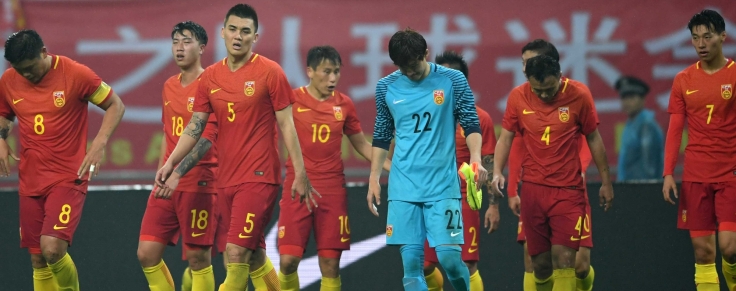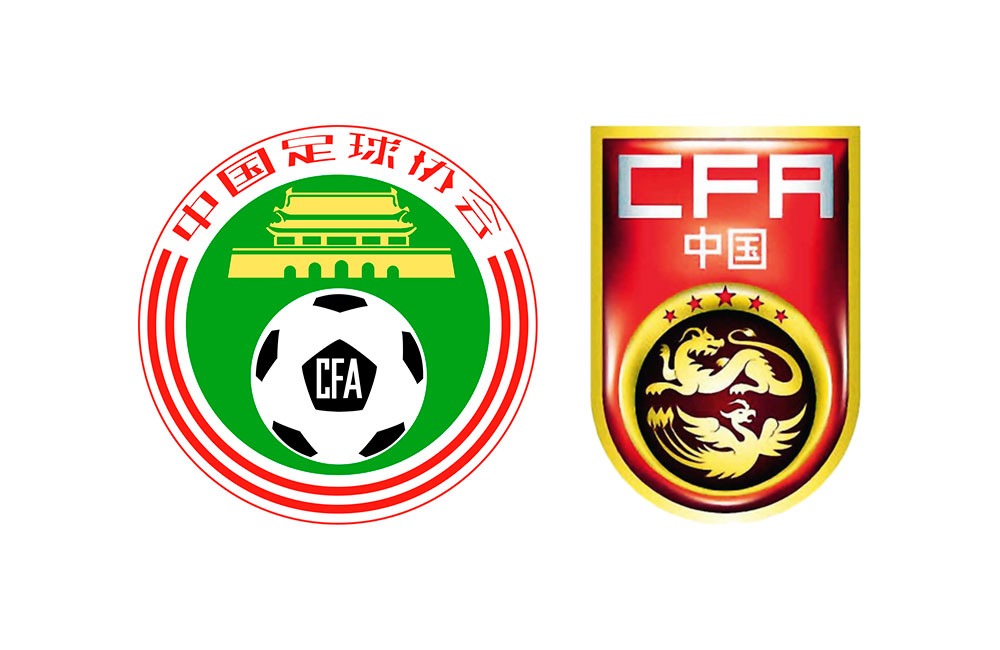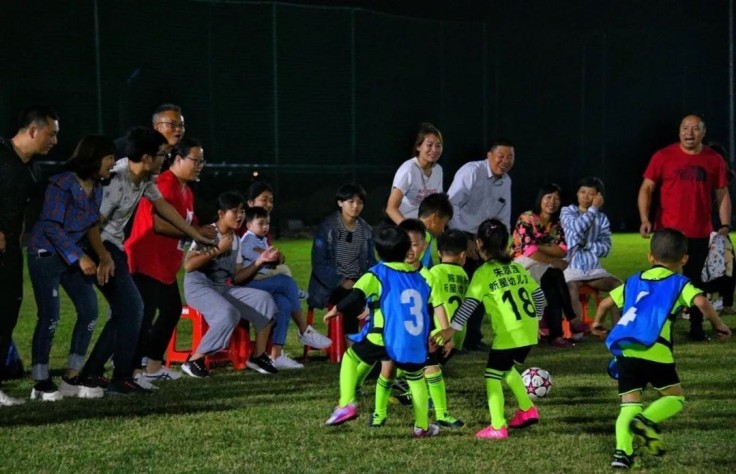
There’s just a few days left for the beginning of 2019 AFC Asian Cup, the 17th edition of this most prestigious four-yearly tournament in Asia. It will be first time in the Asian Cup’s history with 24 national teams contesting for the title, and China is one of them.
As the most populous country in the world who has consecutively participated Asia Cup since 1976 for twelve times, it’s very embarrassing for me to point out the fact that my home country had never lifted any Asian Cup trophy. Although China had reached to the Asian Cup final for two times – one in 1984, another in 2004 – both of those games had the same ending: a disappointing loss. What’s worse is that China initially was regarded as a first-class team in Asia and a strong contender for the Asian Cup title back in 1980s, but now they are just a very ordinary second-class team ranking 7th in Asia. In recent years, China even found progressing beyond the group stage in Asia Cup a difficult task as they consecutively failed to reach to the knockout stage in 2007 and 2011. While countries like Japan, South Korea and Iran had achieved some stunning results in the World Cup, China is still struggling with its goal of “rushing out of Asia” because they have been absent from the World Cup for 16 years after their first appearance in the world-renowned tournament in 2002, and to me their absence record definitely will continue…
I can write an extremely long post to talk about all of those humiliating records of Chinese football. But that does not make sense. As a loyal Chinese football fan who has suffered from the loss of my national team for nearly 10 years, I’d like to look deeper into the issue of Chinese football in this special in-depth feature post, pointing out where exactly are the problems and how can we solve it from my perspective. Want to know more about Chinese football? Follow my lead.
Problem one: A corrupted and unprofessional Football Association
If you ask a Chinese football fan who do they think is the major contributor of Chinese football’s terrible situation, I am pretty sure the most frequent answer you could get is: Chinese Football Association (CFA).

For a long time, as the governing body of Chinese football, CFA was famous for severe corruption issues. In 2009, a large-scale anti-corruption drive led by the Ministry of Public Security aiming to crack down on match-fixing and bribery in Chinese football shocked the whole country. Since then, Chinese public started to understand why their country doesn’t know how to play a small ball well.
Before the anti-corruption drive, professional football league in China was just like a staged play – actors were selected, the plot was arranged. By bribing football officials, referees and players, the “director” hidden in the shadow was able to manipulate what happened on the pitch and create huge profits in football gambling.
In an interview with the Guardian, an unnamed Chinese ex-football player said “30% of Chinese football matches were rigged” at that time.
This scandal ended up with 33 football officials, referees and players being banned from football-related activities for life and some of them were sentenced to jail. They were some big names among those notorious criminals, for example, two former CFA top leaders Nan Yong and Xie Yalong, who were both sentenced to over a decade in jail for accepting huge bribes to arrange referee, manipulate game result and select certain place to hold national team’s game for briber’s business interest.

Obviously, it was a corruption from top to bottom. Serious corruption was embedded in every single cell of Chinese football back to that time. So how could you develop a sport that requires the support of a complete, complex and efficient system in such a dirty environment? NO WAY.
Now the anti-corruption drive in Chinese football has pasted almost 10 years. Corrupted former CFA officials were still in jail. Maybe CFA has solved their internal corruption issues, but they can’t escape from another sin: their unprofessional management.
I don’t want to count how many stupid decisions have been by CFA in the history. It seems like they are the best in the world of always getting on the wrong track. They spent a large sum of money to hire foreign coach who completely doesn’t understand Chinese football, for example, José Antonio Camacho, the man who successfully led China lost 0-8 to Brazil, 1-5 to Thailand; they published a series of policy to make Chinese Super League a joke, namely, forcing domestic players to re-sign their contract in order to limit football player’s income, requiring each club to ensure the total number of foreign players appearing in a match must not exceed the total number of U-23 (under-23s) domestic players, asking domestic players to block their tattoos due to its potential bad influence on society…
The latest brilliant idea proposed by CFA was to form a U-25 national training team. I have to say this idea is just so sooooo great. I don’t know what kind of brain could come up with this idea. You know how CFA formed this U-25 team? Basically, CFA issued an announcement to all the 55 selected young domestic players, telling them their season was ended and they would join a special training camp held in remote area. In the camp, they hairs were shaved to buzz cut; their use of phones was strictly controlled so they couldn’t freely contact with their families – a player even was forced to cancel his scheduled wedding; they had to undergo strict military training in which ideology education is included. I am truly impressed with these methods. Buzz cut, ban on phones, military training, ideology education, all of which are something you can’t believe to be used for training football players in 2018. Most importantly, what on earth do these methods have to do with football???


As a famous Chinese football commentator Liu Jinahong suggested on his Weibo, maybe CFA should consider “dismissing the Chinese Super League and forming five Chinese national teams to compete in five major European football leagues”. I believe that would be even more helpful to the development of Chinese football.
In a word, the people who run the CFA are a bunch of idiots who know nothing about the professional way to create a strong football power. My suggestion for this problem is very simple: PLEASE FIND SOME FOOTBALL EXPERTS TO LEAD THE CFA. Just look at what positive changes has Yao Ming brought to Chinese basketball after he was elected as the chairman of Chinese Basketball Association – Chinese basketball soon went back to the first-class in Asia under President Yao’s lead. I believe same principle applies to football as well.
Problem two: Poor awareness on the importance of youth development
Some people who are not familiar with Chinese football frequently ask a question: China has such a big population base, but why they can’t 11 good football players out of 1.3 billion people?
The answer lies in the fact that Chinese football is not keen to the develop youth players, leading to the dilemma that China only has a very low number of registered professional football players. In a survey conducted by CFA in 2011, it claimed that China only had 8000 registered football players. Although CFA meanwhile admitted the number might not be 100% accurate, it still directly pointed out an undeniable fact: China doesn’t have enough football players.
Developing youth players is the foundation of developing a strong football power. It takes time, patience and money. However, although Chinese investors are not short of money, they deadly lack of time and patience. Many Chinese football clubs have solid financial background, but instead of spending money on developing young domestic talents, they prefer to use sky-high price to purchase famous foreign players from other leagues. While many foreign players came to Chinese league for earning a big fortune, young domestic players could only waste their precious youth on bench without any growth. This phenomenon is part of the reasons why CFA published a weird U-23 policy requiring each club to ensure the total number of foreign players appearing in a match should not more than the total number of U-23 domestic players, although this policy can be dealt with easily by putting a U-23 domestic player in the line-up and replacing him in the first half.

The negative effect of ignoring youth development is clearly reflected in the 2019 Asian Cup. Among 24 teams, China is the eldest team with an average age of 28.74 years. 38-year-old captain Zheng Zhi is still in the squad because currently no young player could replace him. What a shame.
My suggestion? Please put the money used to purchase expensive foreign players on developing young talents in China. I firmly believe that Chinese young players are not worse than foreign players, if given appropriate instructions and sufficient resources.
Problem three: Lack of social support
There is another reason why China is so struggling with developing young players – because Chinese parents don’t want their kid playing football.

To write this post, I conducted several short interviews with my parents, my uncles and my aunts who have their own child, asking them whether they would support if their kid has a dream of becoming professional football player.
Their answer was similar. They were not willingly to do so.
Reasons were more colourful, also more intriguing. One of my uncles said he thinks football should just be a hobby, but not an occupation. One of my aunts worried that playing football is too dangerous because of the potential injuries, another aunt said the future for football players is too uncertain and their life is unstable. As for my parents, my mom believed Gaokao (college entrance exam) should always be the prior choice, and my father was more ruthless: “Chinese football is too terrible. I don’t want you get involved into this dirty business.”
Interestingly, from my father’s old photos taken about 30 years ago, I could tell he once was a crazy football fan.
There are so many reasons to explain why Chinese parents don’t want their kid playing football. China has a long-lasting one-child policy, resulting most families only have one kid. This single kid carries the whole family’s love, dream and expectation, and most parents are obsessed with the wish of their child’s future success. What’s the general definition of success in China? Well, at most of the time, it means studying hard, getting a good result in Gaokao, entering a top university, finding a decent job, forming a happy family, earning enough money and retiring gloriously. It’s like a fixed life track designed for every Chinese kid. If you want to play football, then you will be the one who is out of orbit, which definitely deemed unacceptable to Chinese parents.

Let me tell you a true story. I had a friend who was a real gifted football player. He could dominate the pitch on his own and he led our junior high school to win a trophy in the province-level junior high school football tournament. But when he told his mom he wished to play professional football in the future, the answer he got was to “focus on your study” and “stop playing football because it will distract you from getting a high score in the exam”. My friend was not a genius of study, but he really could be someone if he plays football. Anyway, this story ends with something sad. Now my friend studies in an ordinary university, quitting football for a few fears, although I recently heard his mom was regretful for her past decision. But what can be changed? Nothing.
Until now, I don’t know whether you guys have noticed this. The three problems I have discussed above form a bad circle. Because Chinese football is corrupted, unprofessional and terrible, therefore, Chinese parents don’t want their kid playing football; because it’s hard for Chinese parents to send their kid to football school, China is struggling with developing young domestic talented players; because China can’t produce their own great players, Chinese football becomes more terrible…
I don’t want to be too pessimistic. What I can do as an individual is, if my boy tells me he wants to play football, I will do everything I can to make his dream come true. I am willing to do so, and I do hope other future Chinese parents could share the same thought with me.
Let’s make Chinese football great again!
Something to say at the end
At last, I’d like to share a video shot by me of how I wildly celebrating a critical goal scored by China in an important 2018 World Cup qualifier.
The point here I want to make is that, no matter how many times Chinese football failed me, as long as they made a little progress, my passion is always reserved for them.
You may ask me why.
Well, I think it’s because no matter what, I am a Chinese. I love my homeland. I am proud of my country,
Yeah, proud of China, that’s it.
Want to read more on Chinese football? Check my previous post here:

It’s unquestionable that no matter Chinese football is good or bad, I will support it forever as I’m a Chinese. However, I believe that Chinese football can continuely develop and rush out of Asia in the future.
Overall, thank you Carol for creating this blog and let me know some different perspective about football.
LikeLike
You are welcome bro
LikeLike